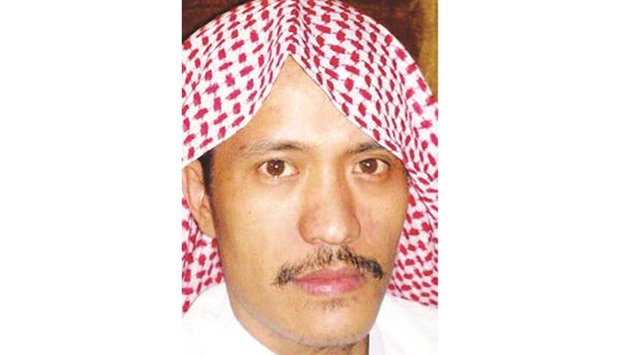
Joselito Zapanta
Joselito Zapanta, the Filipino migrant worker from Bacolor, Pampanga, who was convicted for the murder of a Sudanese over an argument on rent, was executed in Saudi Arabia yesterday, according to the Department of Foreign Affairs (DFA).
“We offer our sincere condolences to his family and loved ones for their loss,” the DFA said in a statement.
Zapanta is the153rd person put to death this year in the ultra-conservative kingdom, according to human rights monitors.
The 35-year-old worker was found guilty by the Riyadh Grand Court of killing Saleh Imam Ibrahim with a hammer following a dispute, the Interior Ministry said in a statement published by the official SPA news agency.
He was executed in Riyadh yesterday, it said.
Executions in Saudi Arabia are usually carried out by beheading with a sword. Zapanta’s mother, Ramona, was still optimistic yesterday morning that her son would come home alive.
“She kept saying, ‘My son is coming home, my son is coming home,’ just as she was informed that Joselito was already taken out of his prison cell,” OFW advocate Susan “Toots” Ople, who was with the Zapantas since the case became “extremely urgent” last weekend.
Ople said the Zapanta family was supposed to hold a news conference after they were told last week that Philippine ambassador to Riyadh Ezzedin Tago has confirmed that the case has become extremely urgent.
“We are talking about weeks here, hence the need for the family to go public in order to seek everyone’s help,” Ople told Manila Times over the weekend.
Zapanta’s mother sobbed uncontrollably after she was told that her son had been executed.
“We had to rush her to a hospital after she fainted when told about the sad news,” Ople said.
Zapanta was sentenced to death after the family of the victim refused to execute an Affidavit of Forgiveness or “tanazul” in exchange for “diyya” or blood money.
Repeated appeals from Philippine officials prompted Saudi authorities to bring down the amount of blood money to be paid to the victim’s family from 5mn Saudi riyals (about P62mn) to 4mn riyals (about P50mn)
Not enough funds, however, were raised to pay the blood money.
Out of the 4mn riyals, Zapanta’s family was only able to raise 1.8mn riyals or P22.5mn.
The amount collected is being kept in a Saudi bank account under the name of the Philippine Embassy.
The DFA said the Philippine government has undertaken and exhausted all diplomatic and legal efforts, and extended consular and legal assistance to preserve the life of Zapanta.
“The Philippine government provided the late Zapanta all necessary assistance and ensured that his legal rights were observed throughout the whole judicial process,” the department added.
It said it arranged and funded jail visits of his mother and sister to the Malaz Central Prison from November 28 to December 2, 2015, and on March 8, 2013 and November 2012.
Foreigners, including a number of Filipinos, in the past had been executed in Saudi Arabia. “We appeal to all our nationals overseas to follow the local laws of their host countries at all times and to avoid involvement in criminal activities,” the DFA said.
Zapanta is survived by his father, mother, sister and two children.
The DFA said it will continue to extend assistance to Zapanta’s family.
Vice President Jejomar Binay expressed his sympathies to the family. “I would like to extend my deepest sympathies to the family of Joselito Zapanta who was executed today for killing a Sudanese in 2009,” Binay said.
“The Office of the Vice President (OVP) worked closely with the (DFA) and exhausted all diplomatic and legal efforts in order to save the life of Zapanta, including a personal written appeal to the Saudi Arabia king,” he added.
Binay in 2012 wrote a personal letter to Saudi King Abdullah bin Abdulaziz al-Saud seeking a deferment of Zapanta’s death sentence.
He said the OVP and the DFA provided Zapanta with all the necessary assistance to ensure that his legal rights were observed throughout the whole judicial process.
According to Binay, the Philippine government was also in constant talks with the family of his victim and was able to secure several extensions for the payment of blood money.
“We likewise issued appeals for help in raising the blood money demanded by the family of his victim, in keeping with Saudi laws. Despite our best efforts– and the kindness and generosity of private individuals, the local government of Pampanga and non-governmental organisations–we were unable to raise the 4mn riyals demanded by the family,” he said.
According to Binay, he will work toward giving better protection and assistance to OFWs.
“Rest assured that a Binay administration will give priority to providing jobs for Filipinos here at home so that overseas employment becomes a matter of choice, not necessity,” he said.
“We shall also work for greater government protection and effective assistance for our fellow Filipinos abroad,” Binay added.
Migrante International, in a statement, said OFWs worldwide “are in deep grief.”
“We extend our sympathies and condolences to the Zapanta family as we hold the Aquino regime partly responsible as it neglected Joselito for lack of efforts in saving him from death.
“We condemn the Aquino government that failed to intervene in a timely manner by asking the Saudi king to grant Joselito a pardon or halt the execution while the Philippine government must show its sincerity and determination to raise amount for his blood money. Instead the Aquino government relied on the OFWs and the public to contribute to raise the needed blood money,” the group’s statement posted on Facebook said.
